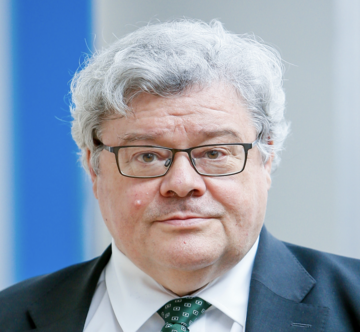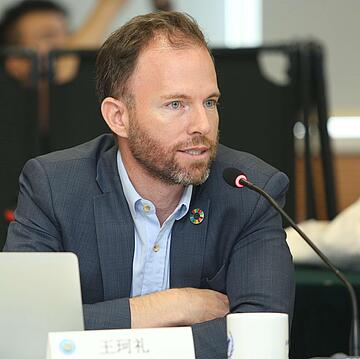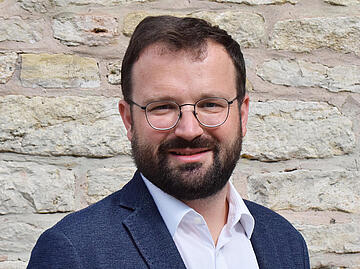Global China Conversations #24
Global Gateway and the Belt and Road: A Sustainable Alternative?
Topic
China's new Silk Road has come under international criticism: under its umbrella, new coal-fired power plants are being built and money is being lent to countries that are already indebted. In 2021, the EU reacted: with the Global Gateway Initiative, it wants to offer a value-based alternative. Until 2027, almost 300 billion euros have been pledged for "sustainable, high-quality projects that meet the needs of partner countries and bring lasting benefits to local people". China's leadership seemed to have had a similar thought at a similar time: Three months before the announcement by the EU Commission, President Xi Jinping proclaimed the end of coal investments along the BRI during the UN General Assembly. It seems to have worked: While more than 50% of energy investments went to fossil energies in 2014-2017, new data from the Green Finance & Development Centre show a significant decline in fossil energy investments since 2021. But how green is the Belt and Road really? Which aspects does the EU want to emphasise? Where is the potential for cooperation? And what does this mean for partner countries in the Global South?
Literature
The impulse lectures refer to the following publications:
Nedopil (2023), China Belt and Road Initiative (BRI) Investment Report 2023 H1
Program
The event consists of different impulse lectures followed by a discussion.
The Global China Conversation #24 will be held in German.
Speakers

Reinhard Bütikofer
Reinhard Bütikofer has been a member of the European Parliament since 2009. He is a member of the Committee on Foreign Affairs (AFET), where he is the spokesperson for the Greens/EFA Group. He is a substitute member of the Committee on International Trade (INTA). He also chairs the Delegation for Relations with the People's Republic of China and is a member of the Delegation for Relations with the United States and an alternate member in the ASEAN Delegation. From 2012 to 2019, he was Co-Chair of the European Green Party (EGP). Before his election to the European Parliament, Reinhard Bütikofer was Co-Chair of BÜNDNIS 90/DIE GRÜNEN (from 2002 to 2008) and previously its Executive Director (from 1998 to 2002). In Baden-Württemberg, he led the regional Green party branch as chairman and was a member of the state parliament from 1988 to 1996. His involvement in the Green Party began in 1984 with his election as a member of the Heidelberg city council. Reinhard Bütikofer is a member of the Europe/Transatlantic Advisory Council and the General Assembly of the Heinrich Böll Foundation (HBS). He is also a member of the NABU Club, a member of ver.di, a member of the German-Israeli Association, the German-Chinese Dialogue Forum (DCDF) as well as the DGAP, the ECFR and the IISS.

Christoph Nedopil
Christoph Nedopil is the Director of the Griffith Asia Institute and a Professor at Griffith University in Brisbane, Australia. He is also a Visiting Faculty at Singapore Management University (SMU) and a Senior Research Fellow at the Central University of Finance and Economics (CUFE) in Beijing, China. Christoph regularly provides advisory to governments, financial institutions, enterprises, and civil society to accelerate the application of sustainable finance. He is the lead author of the UNDP SDG Finance Taxonomy, the Innovative Climate Finance Solutions report for the G20 in Indonesia, and the Green Development Guidance of the BRI Green Development Coalition under the Chinese Ministry of Ecology and Environment. He has authored four books and published articles in Science and other leading journals. Christoph serves as board director in scaling sustainability in businesses and finance. Christoph is quoted regularly in Bloomberg, Financial Times, The Economist, Reuters, Science, and other major outlets. Before joining Griffith University, he served as Founding Director of the Green Finance & Development Center and Associate Professor at the Fanhai International School of Finance (FISF), Fudan University and previously as Founding Director for the Green BRI Center at the Central University of Economics in Beijing. He worked with the World Bank in over 15 countries and was a Director in the German development agency GIZ. Christoph holds a Master of Engineering and a PhD in Economics from the Technical University Berlin, as well as a Master of Public Administration from Harvard Kennedy School.
Moderation

Prof. Dr. Andreas Fuchs
Andreas Fuchs is a Professor of Developmental Economics, Director of the Centre for Modern East Asian Studies at the University of Göttingen, and Director of the Kiel Institute China Initiative. His research analyzes trade, investment and development policies with quantitative methods and a special focus on China and other emerging economies. He also investigates the political economy of natural disasters, humanitarian crises, and non-militarized conflicts.
